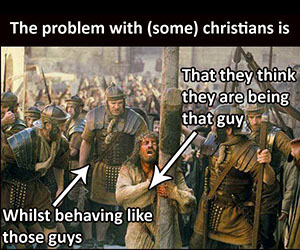
 Worshiptainment is a term coined by tradition-bound “heresy hunters” on the Internet to attack modern worship. While none of us — especially me! — can discern their hearts and minds, their words can certainly give us a good idea of their thought processes because “out of the abundance of the heart, the mouth speaks” (see Matthew 12:34). This article was instigated by a plethora of YouTube videos accusing certain worship songs and styles as being theologically unsound at one end of the accusational spectrum passing through outright heresy and on to idol worship on the other.
Worshiptainment is a term coined by tradition-bound “heresy hunters” on the Internet to attack modern worship. While none of us — especially me! — can discern their hearts and minds, their words can certainly give us a good idea of their thought processes because “out of the abundance of the heart, the mouth speaks” (see Matthew 12:34). This article was instigated by a plethora of YouTube videos accusing certain worship songs and styles as being theologically unsound at one end of the accusational spectrum passing through outright heresy and on to idol worship on the other.
My Own Journey with Christian Music
Before we proceed further, let me share a bit of personal history to give you some insight into my roughly 6- decades-and-counting perspective on this topic.
I was raised as a Lutheran for my entire childhood and adolescence. This was back in the days before most Lutheran synods had assimilated the humanist ideologies of modern pop culture to the point where they can no longer be called “Christian” in my humble opinion. Back when I was a practicing Lutheran, their slide into spiritual irrelevancy had already begun, but for the most part they still clung to orthodox Christian doctrine. So I grew up singing the great old hymns of the faith, such as A Mighty Fortress Is Our God, Onward Christian Soldiers, Crown Him With Many Crowns, and All Hail the Power of Jesus’ Name. The sole instrumental accompaniment was by garden-variety church organs (sadly none of them were pipe organs, one of my favorite musical instruments).
I’ve also always been a huge fan of Handel’s The Messiah and compositions of Johann Sebastian Bach, so classical worship music is definitely on the menu.
After I received the New Birth as a young GI in then-West-Germany, I was exposed to an even broader selection of classic hymns such as Amazing Grace, O For A Thousand Tongues, How Great Thou Art, Christ The Solid Rock, It Is Well With My Soul, and a host of others.
I love them all to this day. I have more than a few of them memorized, not by deliberate effort, but simply through frequency of usage.
 Once I returned to civvy-street and began participating in the Charismatic Renewal of the 1970s, I added Christian Contemporary Music originating out of the Jesus Movement and Calvary Chapel. Those artists included Love Song, Children of the Day, The 2nd Chapter of Acts, Amy Grant, and Honeytree, among others.
Once I returned to civvy-street and began participating in the Charismatic Renewal of the 1970s, I added Christian Contemporary Music originating out of the Jesus Movement and Calvary Chapel. Those artists included Love Song, Children of the Day, The 2nd Chapter of Acts, Amy Grant, and Honeytree, among others.
Then Christian Rock was added to that mix. Such artists included Phil Keaggy, Larry Norman, Randy Stonehill, Sweet Comfort Band, Petra, and Resurrection (later Rez) Band. One of my favorites from this era is Amy Grant’s El Shaddai. My favorite rock song from that timeframe is the late Larry Norman’s “Why Should the Devil Have All The Good Music?” I still have and play many of their albums.
During that same time, I was also loosely associated with the three Christian rock bands ministering in El Paso, Texas: Messiah, Pentecost, Revelation Band. I attended — and occasionally ran sound and/or roadied for — almost every concert they played for several years. Two members of Messiah are my friends to this day.
Then in the early 1980s, I moved to Silicon Valley and got involved with the Word of Faith (WoF) movement. During what I casually term Phase I of that stint, we sang worship songs released under the Hosanna! label. These songs featured artists such as Ron Kenoly and Paul Beloche. In 1993, Don Moen, the founder of Hosanna!, was instrumental (pun intended!) in the introduction of Australia’s Darlene Zschech and Hillsong to the US and, with that, Phase II of that era was launched. I enthusiastically sang all of those songs, too!
A few years later in the late 1990s, the Passion group out of the Vineyard Movement launched a whole new wave of worship music arising from a burgeoning move of God among young people. This is when we saw the awesome likes of Matt Redman and Chris Tomlin appear on the scene (I have an extensive playlist including all those folks to this day). That was beginnings of the revival-centric modern worship we see and experience today. Joining those key players (sorry, another pun! It’s now a two-fer!) are Bethel Music, Elevation Worship, Jesus Culture, I Am They, The Belonging Company, UpperRoom, Maverick City Music, and some newer flavors of Hillsong (United, Worship, Young & Free, etc.).
Fascinatingly, ever since the 1970s, many contemporary worship leaders have paid homage to the old hymns I’ve listed above, so I’m far from the only modern worshipper who recognizes and celebrates the validity of those classic works.
Bottom line? I have been worshipping Jesus employing every musical style represented on that list for almost 70 years and counting. My favorite era by far is the one in which we currently find ourselves, though I can easily worship in any genre opportunity provides.
Critics of Modern Worship
For the most part, critics are from mainline and evangelical non-charismatic denominations rooted in now-defunct moves of God from times long past, the very kinds of folks I called out in a previous article.
 Such critics appear to have developed checklists itemizing the characteristics and standards of what “true” worship should look and sound like. Personally, I have yet to hear a single one of those criteria to be rooted in the Scriptures rightly divided. Few, if any, of modern worship’s characteristics check their boxes of “correctness.” Indeed, few — if any — of a charismatic service’s characteristics would check those boxes, for that matter! But I digress…
Such critics appear to have developed checklists itemizing the characteristics and standards of what “true” worship should look and sound like. Personally, I have yet to hear a single one of those criteria to be rooted in the Scriptures rightly divided. Few, if any, of modern worship’s characteristics check their boxes of “correctness.” Indeed, few — if any — of a charismatic service’s characteristics would check those boxes, for that matter! But I digress…
Some of that is because some of them are old folks used to their solemn worship services being accompanied by organs and/or pianos playing the old classic hymns. Contrast that with a rowdy charismatic crowd having a decidedly younger demographic. Their worship is accompanied by a band playing acoustic guitars, lead, rhythm, and bass electric guitars, an acoustic or electronic drum set, 1 or 2 keyboards, plus possibly one or more violinists and/or cellists and/or percussionists. The whole band is playing through excellent PA systems with subwoofers that can shake your seat (the only kind of PA worth listening to, in my professional opinion as a former church sound engineer). Most of the songs have been written during the last decade or so.
Critics cannot fathom worshipping in that kind of environment because to them, that’s what you have at a secular rock concert. Almost all of the video presentations of modern worship services use camera techniques developed for such concerts. Since critics would never darken the door of a live worship event, that’s all they have to work with.
Anything remotely smacking of that secular concert world is completely inconsistent with their stodgy assumptions of what a valid church service should be. So they erroneously conclude those present are there for entertainment, not worship, mistakenly assuming those present are totally about their emotions with zero sound doctrine (yes, another pun! This is fun!). It appears their attitude is, “If I cannot worship in such a setting, then it’s patently impossible for anyone else to.”
“Objection! Assumes facts without evidence!” as lawyers say in open court. I’ve lost count of the modern worship services I’ve attended at churches of all denominational stripes with congregations varying from a few hundred to several thousand and I have personally witnessed no, I repeat no, none, zero, zilch, nada attendees there for mere entertainment, though admittedly a statistically insignificant number of such individuals are certain to have been present. I mean, the last time I checked, the ability to discern the thoughts and intentions of others’ hearts is way above our pay grade. Truth be told, none of us can accurately discern the thoughts and intentions of our own hearts most of the time, much less others. But again, I digress…
On the other hand, in any given church service, you will always find a certain percentage of folks who choose not to sing or otherwise openly participate for assorted reasons of their own. Here are some possible reasons:
- They could be introverts who find open displays of emotion embarrassing.
- They could be people who are too embarrassed to sing because they cannot carry a tune in a bucket with a lid on it.
- Perhaps they are struggling emotionally or physically and cannot bring themselves to engage because of their grief and/or pain.
- Maybe they are so caught up in His presence, so overcome by His goodness, that they are too emotionally overwhelmed to lift their voices. This is conceptually similar to a bridegroom being so choked up by the sight of his bride walking down the aisle that he simple cannot speak coherently.
- Some are in the grip of guilt and shame over besetting sins, real or imagined, and feel unworthy to come before our holy God.
- It could be they have not even received the New Birth, for that matter, and therefore don’t have a relationship with the God they are expected to worship.
- Maybe they have little or no experiential revelation of God’s goodness, grace, mercy, holiness, and love
From both my own walk with God and my experiences in a wide variety of church settings, the last one seems to be a major culprit.
Praise Him for His mighty acts; Praise Him according to His excellent greatness!
Psalm 150:2She has been forgiven of all her many sins. This is why she has shown me such extravagant love. But those who assume they have very little to be forgiven will love me very little.
Luke 7:47 TPT (emphasis mine)
We will worship Almighty God to the extent we perceive His excellent greatness: the greater our perception, the more we will praise Him.
Now all that does not imply modern worship critics are non-participants in worship neither am I making any such claim. All I am saying is this: in any given church service, there will always be those who decline to participate for reasons of their own. I do have to say from personal observation the percentage is much, much higher in traditional churches than in modern worship settings.
 Which leaves us with a burning question: why are critics driven to make their attempts to call modern worship into question in the first place?
Which leaves us with a burning question: why are critics driven to make their attempts to call modern worship into question in the first place?
Again, their thought processes and motivations are way above our pay grades, but I think it entirely safe to say much of it is related to issues I raised in a previous article here on Miscellaneous Ramblings. With few exceptions, most of them appear to be desperately trying to retain relevancy in the midst of a worldwide revival which is rapidly leaving them behind.
Criteria for the Musically Challenged
For those still struggling to distinguish between a rock concert and a modern worship service, let me itemize several crucial distinctives between them:
- Rock concerts: The goal is to entertain the audience, to show them a good time. Party on, dude!
Modern worship: The goal is to lead the audience into God’s presence in praise, thanksgiving, and worship.
- Rock concerts: The focus is on the musicians’ music, their vocal and instrumental virtuosity, and their “mystique” (for lack of a better word). By mystique, I mean the signature “things” they are renowned for, such as Black Sabbath’s identification with satanism, the guitar prowess of Jimi Hendrix, the drug-focused themes of a Grateful Dead performance, the awe-inspiring multimedia shows at a Pink Floyd concert.
Modern worship: The focus is on Jesus. Period.
- Rock concerts: The musicians wear costumes — often outlandish ones! — intended to enhance the audience’s focus on each of them as individuals. Many of them are risqué. Some items of apparel become their signature “uniform,” such as the top hat worn by Slash (the lead guitarist of U2), or the weird costumes and grotesque makeup of KISS.
Modern worship: The singers and musicians wear normal street clothes.
- Rock concerts: The musicians “act out” in bizarre, freakish, sexually provocative, even deviant behaviors, again to further the audience’s attention upon them and the band’s mystique. Examples abound here, such as Ozzy Osborn biting off the head of a bat onstage, David Lee Roth’s prancing about the stage while displaying sexually suggestive expressions, poses, and gestures, or Michael Jackson’s moonwalking and crotch-grabs.
Modern worship: The band simply stands there and sings and/or plays their instruments. Some of them dance before the Lord. For you non-charismatics, that’s entirely scriptural behavior, I might add.
- Rock concerts: The musicians are all about me, me, me.
Modern worship: The musicians are all about Jesus, Jesus, Jesus.
Where Does That Leave Us?
First, my personal admonition is to stay out of social-media theological discussions. Why? There is tremendous amount of heat and precious little light being generated by a bunch of folks proclaiming themselves as Christians who know just enough to be dangerous.
I certainly have!
 They, like the rest of our postmodern culture, are “right fighters” whose self-image is rooted in their “rightness” with zero fruit of the Spirit being evidenced rather than the Word and love of God. They see “heresies” (defined as some concept or movement at odds with their cherished opinions) under every rock and are hell-bent (literally) on rooting them out. Such folks are a new unofficial Spanish Inquisition (who no one expects! 🙂 ) running amok with every Tom, Dick, and Harry having a theological axe to grind voluntarily enlisting themselves regardless of their personal qualifications to assume the post.
They, like the rest of our postmodern culture, are “right fighters” whose self-image is rooted in their “rightness” with zero fruit of the Spirit being evidenced rather than the Word and love of God. They see “heresies” (defined as some concept or movement at odds with their cherished opinions) under every rock and are hell-bent (literally) on rooting them out. Such folks are a new unofficial Spanish Inquisition (who no one expects! 🙂 ) running amok with every Tom, Dick, and Harry having a theological axe to grind voluntarily enlisting themselves regardless of their personal qualifications to assume the post.
Second, find God’s choice for the church you should be attending, then obey Him. If He leads you to one where the worship is well within your personal preferences, well and good. If not, adapt and keep your criticisms to yourself. He has you there to remove you from the most dangerous place a Christ-follower can ever find him- or herself:
A comfort zone.
Selah!
Thanks for reading!

